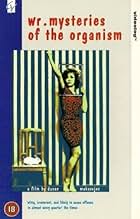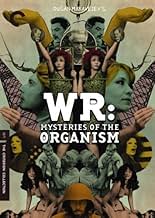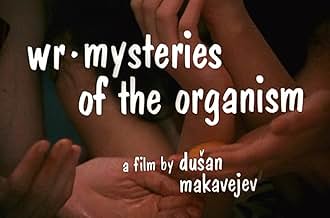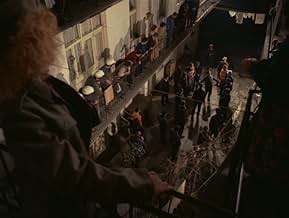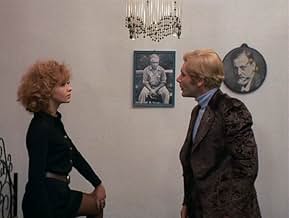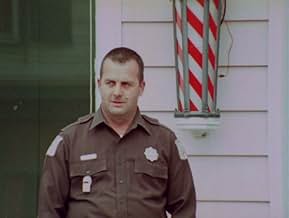IMDb RATING
6.6/10
5.7K
YOUR RATING
An homage to the work of psychologist Wilhelm Reich, matched with a story about a Yugoslavian girl's affair with a Russian skater.An homage to the work of psychologist Wilhelm Reich, matched with a story about a Yugoslavian girl's affair with a Russian skater.An homage to the work of psychologist Wilhelm Reich, matched with a story about a Yugoslavian girl's affair with a Russian skater.
- Awards
- 3 wins total
Mikheil Gelovani
- Joseph Stalin
- (archive footage)
Zedong Mao
- Self
- (archive footage)
- (as Mao Zedong)
Wilhelm Reich
- Self
- (archive footage)
David Henry Bradley Jr.
- Self
- (uncredited)
- Director
- Writer
- All cast & crew
- Production, box office & more at IMDbPro
Featured reviews
10theemu
Makavejev was always one of the clowns of the Third Cinema, and WR, his masterpiece, is no exception. Makavejev interweaves fiction, documentary, and found audio and video clips (a Stalinist propaganda film, electro-shock treatment footage) to create a fantastically bizarre but intelligent discussion of both the orgone energy theory of Wilhelm Reich and the relationship between Yugoslavia and the USSR in a post-Stalinist era.
I know. It sounds tedious, but it isn't. In fact, it's really fascinating. Among the clips Makavejev (a film theoretician in his own right, WR harkens back to the pre-Stalinist era of Soviet Montage) assembles are footage of performance art by the Yippie poet/singer Tuli Kapferberg and documentary clips of Jim Buckley, an editor for Screw Magazine, getting a mold of his penis made.
WR is bizarre, dogmatic, and at times, hard to watch, but having seen it twice now, I've come to appreciate its ways. By the time Vladimir breaks into song at the film's end, you'll be smiling too.
I know. It sounds tedious, but it isn't. In fact, it's really fascinating. Among the clips Makavejev (a film theoretician in his own right, WR harkens back to the pre-Stalinist era of Soviet Montage) assembles are footage of performance art by the Yippie poet/singer Tuli Kapferberg and documentary clips of Jim Buckley, an editor for Screw Magazine, getting a mold of his penis made.
WR is bizarre, dogmatic, and at times, hard to watch, but having seen it twice now, I've come to appreciate its ways. By the time Vladimir breaks into song at the film's end, you'll be smiling too.
I saw this originally at a showing at the British Film Institute years ago and it blew my mind. Every film student should see it. A subversive mix of politics and sex, it shows just how boring and middle class Monty Python, the Farrelly Brothers, et al really are. A non sequitur to the 9th degree, it shows the power that cinema can have on an audience. Considering the age of this film, it is incredible how outrageous it is. Once you've seen it, you will never forget it. It is truly a land mark film in the realm of the surreal. A must viewing for everyone.
I completely disagree with the comments of the previous reviewer. Personally knowing very little about the Orgone or Wilhelm Reich, I derived great enjoyment from this film. In fact, I popped in on the TV just to get an idea of its style and structure (without planning to watch it right then) and ended up getting sucked in and watched it all the way through. Makavejev's filmmaking (that I've seen) is quite different from the norm, but not in an overly self-conscious or self-serving way, like Hal Hartley's efforts. "WR" is egoless, simply using film to draw parallels and make observations that are done quite effectively in Makavejev's unique style. It reminded me of the "I am Curious" films, but those are also a bit too self-conscious for me. I also highly recommend Sweet Movie, a later film of his. I only wanted to post these comments in light of the previous user's comments, as we should all remain aware of how subjective one's tastes are from another's. I didn't like the previous user making such blanket statements like "I suppose it might be watchable enough for people who are familiar with Reich, but if you aren't, then I strongly urge you to avoid this film at all costs." when tastes are obviously so variant - remember, I knew barely anything about WR or the Orgone, and enjoyed the film tremendously. Thanks for your time.
Directed by Serbian filmmaker Dusan Makavejev (also known for directing 'Sweet Movie', and the Australian produced 'The Coca-cola Kid'), the film mixes documentary and narrative cinema, to comment on the infiltration of Soviet Communism, sexual politics/sexual revolution, in a political satire. The main drive of the film to begin with is the work of Austrian-American psychiatrist and psychoanalyst, Dr Wilhelm Reich: His theories of Organon therapy (use of static electricity), and the connection between neuroses in people that is rooted in physical, sexual and social surroundings. This connects also with the work of Alexander Lowen, an American psychotherapist (and student of Reich's), who practices and teaches Bioenergetic analysis which uses therapeutic body work to associate the mind with the body, and in theory release repressed energy through the body sexually without the act of physical sex. I observed in these sequences a kind of connection to the work of Arthur Janov, and his primal scream therapy.
The narrative section of the film tells the story of Milena (Milena Dravic) and her sexually promiscuous flatmate Jagoda (Jagoda Kaloper), and their theories and speeches of sexual revolution: "The October revolution was ruined when socialism rejected free love". They meet a Russian communist figure skater, Ivica (Vladimir Ilivich), who they seduce. But Milena soon discovers that communism has no time for sexuality unless it is first met with physical violence. This seems to be a metaphor for the struggle against Stalinist communism within Yugoslavia since the second world war. But in the film Ivica seems somewhat deluded by the concept of communism (as he states, "communism is a Latin word meaning communal), whilst almost being made rigid by the sexual intentions of Milena.
The most interesting part of the film is the first part that focuses on the life and work of Wilhem Reich (hence the W. R. in the films title). He first started working in psychoanalysis with Sigmund Freud in the 1920's, but after writing books such as 'The Mass Psychology of Fascism', fled Austria for America, where he settled in Maine. He worked on his theories of orgone therapy, and developed the orgone accumulator, an organic box lined with lead that individuals would sit in and is theorised as giving both therapy to the bodies organs and to sexuality (The use of the orgone accumulator was even endorsed by William S. Burroughs.). Eventually Reich was arrested (more than likely the victim of situation - i.e. he was from behind the iron curtain), and viewed as insane - despite being tried in court. All of his books were burned in New York, supervised by the federal food and drugs administration agents (take from that what you will).
It is an interesting film. The different strands are connected by the theories of Wilhelm Reich. But it's one of those films that is probably more interesting to talk about than watch as it is incredibly slow moving, and at times seems to focus on activities (such as bioenergetic analysis), as group fad, and seems to almost fall into a 'new age' enlightenment message. Released in 1971, this would make sense, as the sexual revolution was in full 'swing'. Despite all of this it is a relatively enjoyable piece of cinema, with some nice ideas in it. But again, the life of W R far outshines the film as a whole.
www.the-wrath-of-blog.blogspot.com
The narrative section of the film tells the story of Milena (Milena Dravic) and her sexually promiscuous flatmate Jagoda (Jagoda Kaloper), and their theories and speeches of sexual revolution: "The October revolution was ruined when socialism rejected free love". They meet a Russian communist figure skater, Ivica (Vladimir Ilivich), who they seduce. But Milena soon discovers that communism has no time for sexuality unless it is first met with physical violence. This seems to be a metaphor for the struggle against Stalinist communism within Yugoslavia since the second world war. But in the film Ivica seems somewhat deluded by the concept of communism (as he states, "communism is a Latin word meaning communal), whilst almost being made rigid by the sexual intentions of Milena.
The most interesting part of the film is the first part that focuses on the life and work of Wilhem Reich (hence the W. R. in the films title). He first started working in psychoanalysis with Sigmund Freud in the 1920's, but after writing books such as 'The Mass Psychology of Fascism', fled Austria for America, where he settled in Maine. He worked on his theories of orgone therapy, and developed the orgone accumulator, an organic box lined with lead that individuals would sit in and is theorised as giving both therapy to the bodies organs and to sexuality (The use of the orgone accumulator was even endorsed by William S. Burroughs.). Eventually Reich was arrested (more than likely the victim of situation - i.e. he was from behind the iron curtain), and viewed as insane - despite being tried in court. All of his books were burned in New York, supervised by the federal food and drugs administration agents (take from that what you will).
It is an interesting film. The different strands are connected by the theories of Wilhelm Reich. But it's one of those films that is probably more interesting to talk about than watch as it is incredibly slow moving, and at times seems to focus on activities (such as bioenergetic analysis), as group fad, and seems to almost fall into a 'new age' enlightenment message. Released in 1971, this would make sense, as the sexual revolution was in full 'swing'. Despite all of this it is a relatively enjoyable piece of cinema, with some nice ideas in it. But again, the life of W R far outshines the film as a whole.
www.the-wrath-of-blog.blogspot.com
10NateManD
WR: Mysteries of the Organism, is one unique if not messed up viewing experience. Part documentary and part fictional surrealist philosophical sex comedy, Serbo-Croatian director Dusan Makavejev assaults the viewers senses with imagery, music, politics and satire. "Mysteries of the Organism" is on many top 1000 film lists, but for some odd reason it is nearly impossible to track down. Just like Makavejev's other film "Sweet Movie", I was put on a several month waiting list on Amazon. Thank god for ebay! This is a film that screams for a DVD release, but I don't think many distributors want to touch it due to it's explicit sexuality and subversive elements. The film starts off as a documentary on Wilhelm Reich, a scientist who studied the orgon and used the human orgasm as a method for healing. Of course, similar to the scientist Tesla; his books were seized and burned by the U.S. government and FDA. Then the second part of the film deals with Milena, a sexually liberated Yugoslavian girl who makes revolutionary speeches on her apartment balcony. She says "The October Revolution failed by not excepting free love". Later she falls in love with a Soviet figure skater who's afraid to express his sexual feelings. So this film is a comedy, based on the politics of human sexuality. It mocks capitalism and communism for suppressing people's sexual desires. Now if only I could find the soundtrack. My rating is 10/10, which means I'll watch it again!
Did you know
- TriviaBanned in Yugoslavia immediately after release.
- Quotes
Narrator: Comrade lovers, for your health's sake, fuck freely!
- Alternate versionsAlthough this film was passed uncut for UK cinemas upon its original release, the 1995 Connoisseur Video release used an edited print which was shown on Channel 4 as part of a 1991 censorship season. This TV version used psychedelic computer generated masking techniques to hide some of the more explicit details, including genuine sex during the opening Soviet sex education film, the images on the wall paintings showing people masturbating, and all shots of Jim Buckley's penis as a plaster cast is made of it (which was obscured by digitally animated stars).
- ConnectionsEdited from Klyatva (1946)
- How long is WR: Mysteries of the Organism?Powered by Alexa
Details
- Release date
- Countries of origin
- Languages
- Also known as
- WR: Mysteries of the Organism
- Filming locations
- Rangeley, Maine, USA(Wilhelm Reich Museum/commune and town scenes)
- Production companies
- See more company credits at IMDbPro
- Runtime1 hour 24 minutes
- Color
- Sound mix
- Aspect ratio
- 1.37 : 1
Contribute to this page
Suggest an edit or add missing content

Top Gap
By what name was WR ou les mystères de l'organisme (1971) officially released in India in English?
Answer

